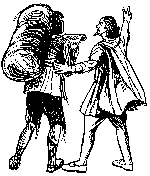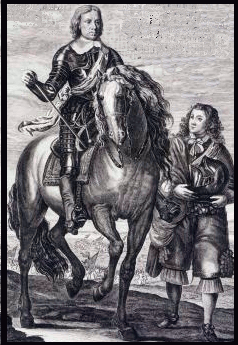
This Page Title – Men of the Awakening — John Berridge
The Wicket Gate Magazine "A Continuing Witness".
Internet Edition number 76 – placed on line January 2009
Magazine web address – www.wicketgate.co.uk

When George Whitefield and the Wesleys were thrust out of the pulpits of the Established Church of England and began preaching in the open air, they were fanning the first flickerings of a fire that was to burst into the great Evangelical Awakening of the 18th Century. Morally and religiously, the whole of this island appeared to lie in the lap of the evil one. Organised religion had sold its self to the gods of the hour, and if we today may grasp at any glimmer of hope for our own spiritual condition, then, perhaps, we might find it in recalling that it was in the midst of such awful blackness before that the Lord sent forth His light and revived his praise once again.
The names of Whitefield and the Wesleys are, of course, the names that are most readily associated with that great time of glorious light. But when God revealed His mighty arm at that time, He revealed it, not only in these worthy brethren, but in a band of powerful preaching evangelists, as well, who traversed the countryside on the backs of their horses proclaiming the gospel of God's free unmerited grace to sinners.
Over the next few editions, I want us to think of some of these Men of the Awakening, and pray that the Lord might again be pleased to rustle the branches with the winds of reviving grace and raise us up to be generation of evangelists such as they were. For, wherever the opportunity presented itself, they preached. And this is what marked them out; they preached! "On horse-blocks, market crosses, churchyard walls, tombstones, doorsteps, or window-sills," we are told, "anything that occasion or ingenuity could provide." These were their pulpits, and from those they preached! Men like John Berridge, Howell Harris, Rowland Hill, William Grimshaw, William Romaine, Daniel Rowlands, Henry Venn. These were but some of the men of that awakening time. And when we consider that the first of our brief sketches involves a man - John Berridge - who was the means of awakening almost 4000 souls in one particular year, then we may be well-persuaded that these men deserve a place in our thoughts as well as those of greater fame and more notable exploits.
John Berridge was born in the year 1716, and although he appears to have had some early "religious impressions," there were soon lost when he went up to Cambridge to begin his ministerial studies. Neither he, nor any of his fellow-divines, nor, indeed, their tutors appear to have had any knowledge of evangelical saving faith and, like many in our own day, John Berridge entered, passed through and out of his theological training and into the pastoral oversight of a church without either knowing or embracing the gospel of justification through faith alone. It was in the year 1755 that he moved to Bedfordshire and to what was then the little village of Everton. Here he was to remain until his death in 1793, but the thing that links his name immortally to that place as far as the church of Christ is concerned is what took place there two years after his arrival. As the pastor of Everton John Berridge was a diligent man, even though it was a zeal that was not according to knowledge. However, in the year 1757 the Lord in His grace laid claim to that zeal and directed it to His own praise and glory. "Cease from thine own works," came the voice of God to the Everton minister's soul, "only believe." And with that belief there came a life of service devoted to Christ and to His gospel. "I fear my weekly circuits would not suit a London or a Bath divine," he once wrote to a friend, "Long rides and miry roads in sharp weather. Cold houses to sit in, with very moderate fuel, and three or four children roaring or rocking you about. Lumpy beds to lie on, and stiff blankets like boards for a covering. Rise at five in the morning to preach; at seven breakfast on tea that smells very sickly; at eight mount a horse with boots never cleaned, and then ride home, praising God for all His mercies."
Such was the life of a man of those times, for his life was preaching. On one occasion, our old friend was called before the Bishop and was accused of preaching in other men's "parishes" and preaching at all times of the day and night. "My lord," he said modestly, "I preach at only two seasons." "Which are these, Mr. Berridge?" "In season and out of season, my Lord." So it was! He travelled wherever he was asked to preach and could find ready ears, but it was especially around his own shires that he loved to labour most for his Lord. Here he preached the word, established farm meetings, and provided out of his own pocked for the upkeep of some young evangelist who would care for the souls that had come to new-found faith under his sermons. In this respect he was "the cheerful giver." At a time when it was more the custom for the clergy to "devour widows' houses" old John Berridge left himself penniless for the work of the Saviour. To support his young evangelists he sold the silver plate from his home, and where a cottage had been used for the preaching of the Word it was his custom, instead of looking for a "preaching fee", to slip the poor woman of the house a half-crown to defray the cost of heating the humble abode.
Great in heart, and great in mind, too, was John Berridge, possessing one of the mightiest intellects of his time at Cambridge where he became a Fellow at Clare College. And yet, like his Master before him, when he spoke "the poor people heard him gladly." In fact, it is for his "quaintness" that many seem to remember him best and for which his enemies condemned him most. That this was part of his natural frame he readily admitted. "Odd things break from me as abruptly as croaking from a raven," he said. But, how those odd things were owned and used of the Lord as hearers thronged to attend his meetings, occupying even the crossbeams of the churches, it is said, and hardly leaving enough space for him to turn round in the pulpit.
His style of preaching was "unique" it would be supposed, for the spoke of coming to preach with "a sack well filled with well-baked wheaten bread," but, he went on, "the bottom came out of the sack, and I have nothing left for you but five barlet loaves and a few small fishes. But you will have those loaves hot from the oven," he went on, and, indeed, those loaves proved to be "food convenient" to many souls, for behind all the quaintness, so called, there lay a body of Divinity that was at the very heart and soul of the Evangelical awakening. Hear him as he speaks about that old illusion, the free will of man. "Nature," he says, "lost her legs in Paradise, and has not found them since; nor has she any will to come to Jesus." Listen to what he calls justification by faith alone; "The jewel of the gospel covenant, the groundwork of the Reformation, the glory of the British church." Regarding pride, he says that he can love it and hate it; quarrel with it and embrace it; "It pleads a right through the fall," he says, "to be a tenant for life, and has such a wonderful appetite, that it feeds kindly both on grace and garbage."
No wonder, then he advises his fellow-preacher to begin their sermons by "laying open the innumerable corruptions of the hearts of your audience …" and no wonder that he preached and laboured for thirty years under the title of "The old devil," for while such preaching suits the needy sinner it also wakes the ire of the self-righteous. However we might say of him what he said of another, "He hast lost his character right honestly by preaching the gospel without mincing it."

This Page Title – Men of the Awakening — John Berridge The Wicket Gate Magazine "A Continuing Witness". Internet Edition number 76 – placed on line January 2009 Magazine web address – www.wicketgate.co.uk |